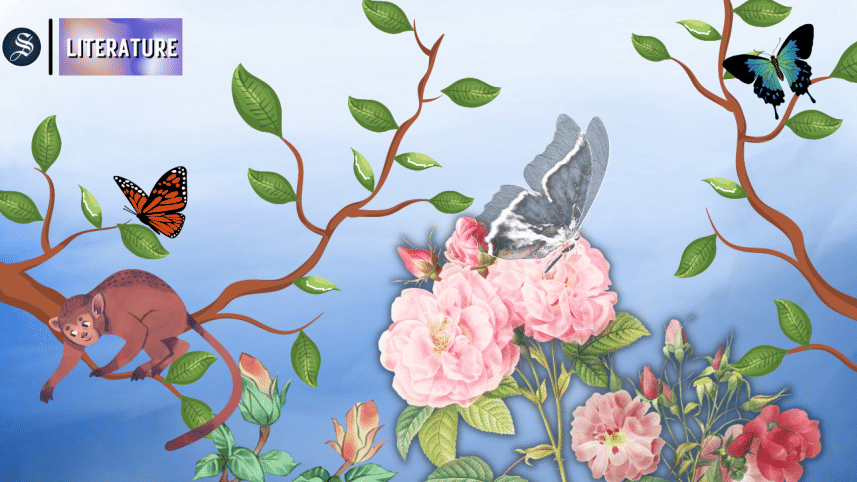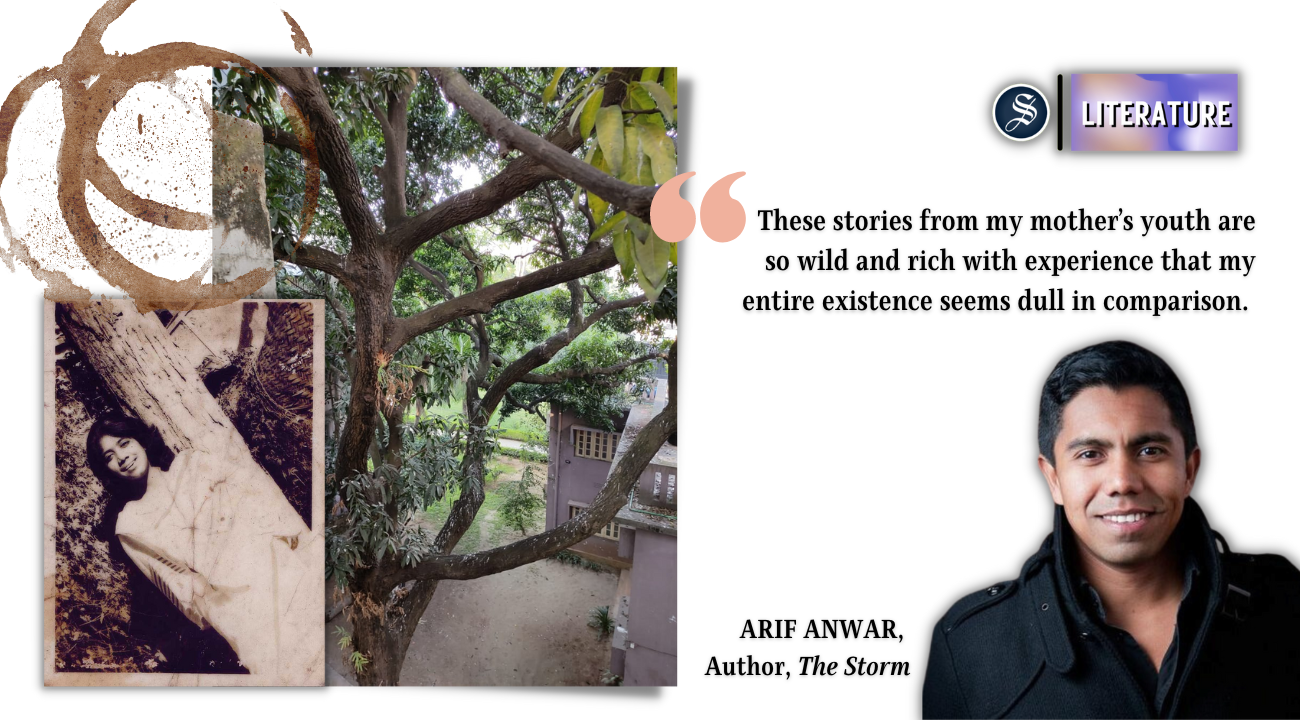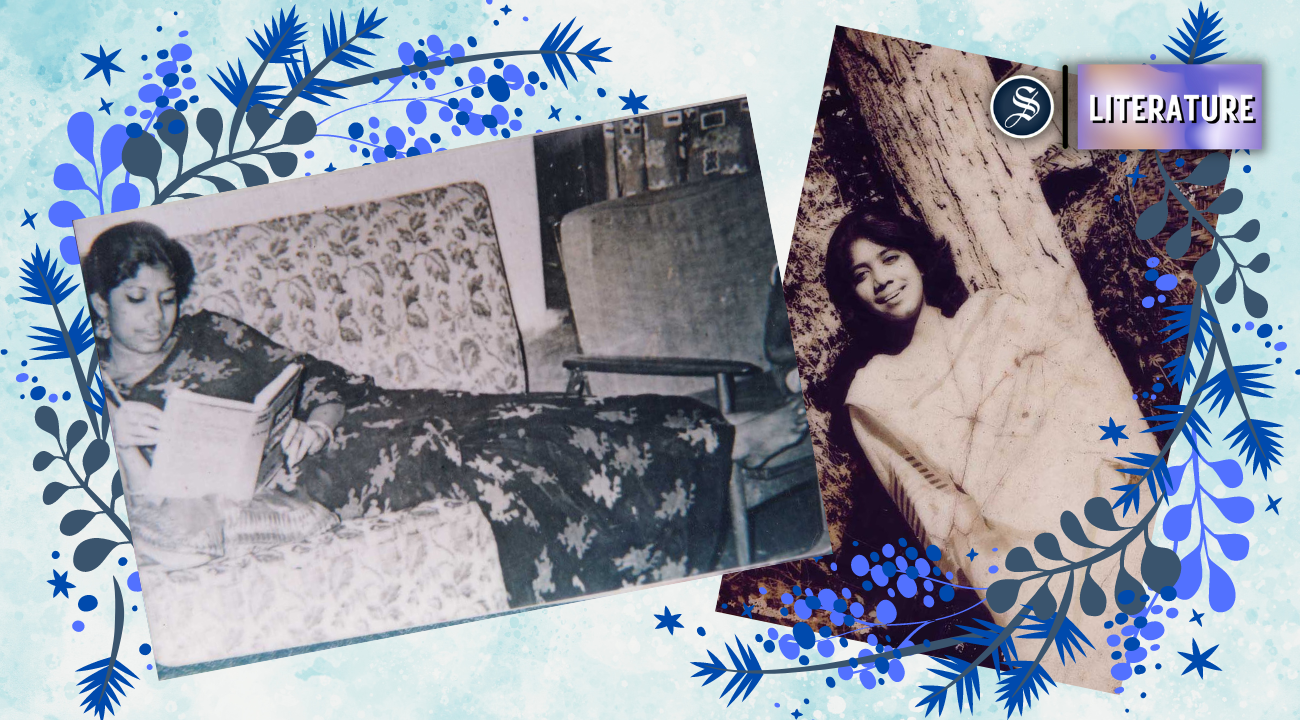Cement Swans

After a year at Kamrunnessa Girls School in Dhaka our city life came to an end as my father was transferred to Noria, a town in Faridpur district. We were allotted a large house that once belonged to a zamindar family.
The house had thick walls and columns carved into which were statues in various poses of Bharat Natyam. Colorful decorative light bulbs were set around the door frames. The doors themselves were heavy, tall and wide, with blue glass in a half-moon shape on top. On the lintel was a sun shape made of chips of wood, and the same line of multi-coloured, non-functional light bulbs.
There were many rooms and the ceiling was high to keep one cool in the summer. The kitchen was a separate structure and a concrete poultry pen was nearby. My father's office was spread across two large rooms at the front of the house that faced the courtyard, next to which was a fragrant rose garden.
I found the scent of the roses intoxicating. They differed by the time of the day; morning smelled different than noon, and noon in turn smelled different than night. I learned that the roses were named Basrahi Gulabs, named after the ancient city in Iraq. On moonlit nights when the perfume of the roses thickened the air, I was in a trance, an ecstasy of body and mind. Through the tall window near my bed, I would look to the night, the vast horizon studded with stars, the full moon. The beauty of the night has held an allure for me my whole life.
From my verandah a wide staircase descended to the courtyard, the balustrades terminating in the shape of raised elephant trunks. On the other side of the courtyard were the offices of my father's subordinate officers. Beyond was a field, alongside which ran a narrow path that led to a nearby forest. I was the only one who would visit this patch of jungle. I would go in there during the hot summer noons and pick fruits that were hard and colourful like beads.
At the four corners of the roof of the constabulary were massive cement swans spreading their wings. I was standing on the terrace one day when one of them crashed down very close to me, breaking into several pieces with a loud sound and missing me by no more than a foot. People said that I was spared by God, but I was too young to appreciate just how lucky I had been to escape.
In Noria I once again had to be admitted to a new school, this time for Class Five. This school was nominally a co-educational one–as I was one of only two girls in a class of thirty-five. The other girl's name was Rashida, the daughter of one of the subordinate officers in my father's office. She was also my neighbour. As the only two girls in the class we quickly became friends. We gossiped a lot, much of it concerning our future marriages. These discussions usually happened after school, when we bathed in the pond by our house. The pond was large and had a paved bank. On one side a large mango tree reached halfway across the pond, the branch dipping low and touching the water. Rashida and I would swim from the bank to reach this branch. We would climb up on it and sit. Then the discourse about our marriages would truly begin. We would run down the list of boys in our class, the agreed upon rule was 'first come first served', whoever one of us named first the other could no longer claim as a future husband. Unfortunately there was an odd number of boys in our class, so inevitably Rashida and I would have a tug of war over a boy named Maula Box. The dispute would always remain unsolved even after arguing so long that our clothes dried out. even when our clothes had dried. Then we would swim back to the paved bank.
My friendship with Rashida lasted the whole time I was in Noria, but I always felt she retained an undertow of malice and resentment towards me. I noticed this when I recited to her poems that I had written and she would say (perhaps with the intent of hurting my feelings) that she had read it before in a book.
Other than Rashida I didn't have many friends in Noria. This didn't bother me as I liked my own company and made my own entertainment. One such entertainment was to watch ants at work. During hot afternoons this was done best under the shade of a tree. I was concerned by the ants' endless ambulations in search of food. One day, my mother was astonished to find a whole pot of sugar spread out all over the yard. I explained that I had done so to feed the ants and give them a break from walking.
Our house overlooked a field, to the right of which was Rashida's house, and to the left a narrow path that led to a small forest that I would visit mostly in the afternoons. I seldom saw anyone else there, as during the hot summer days in the villages the women napped with their young children on cane mats and the men retreated from their work in the fields for a respite from the sun. On those hot days an enchanting stillness fell upon that place. I could hear even a single leaf fall, and the humming of bees and flies were pronounced. The vegetation smelled hot, dark and green. At those times I felt as does an intruder in a sacred place. I would try to catch butterflies, or spy resting birds, and collect hard wild pink and purple fruits in the folds of my frock, until I heard footsteps from the path nearby and the spell was broken.
However, on certain days of the week I could not go for my afternoon jungle visits as at that time I was tutored in Arabic and Islamic studies by a mullah who came to our house. He was a young man with bright and fair skin, glowing with good health. When I asked for the secret to his wondrous complexion he replied with serene certainty: "This glow is the Noor of Allah, child."
Following his departure that day, I sat and wondered as to how I too could gain this noor of Allah. Too impatient to cultivate it through a lifetime of piety, I chose the next best option. Before the mullah's next visit, I smashed a mirror and, scraping off the mercury, smeared it all over myself. When the mullah arrived, I showed him my newly resplendent limbs with pride, "Look huzur, I am like you now." But rather than express joy at our newly shared luminescence, or concern that I had smeared a highly toxic substance on my skin, the mullah became angry, thundering, "Do not trifle with the Noor of Allah!".
The noor incident came about at a time when I was freshly obsessed with religion and spirituality. I had just read the biography of the sufi mystic Rabia of Basra and wished to be like her in every way. I would tie a bandana on my head and pray for hours. I would hope that the miracles that happened during her life would happen in mine–I would put a four anna coin under my pillow and pray that it would double in amount. And at one point I thought this did happen, but I may have just forgotten the amount of money I had put under my pillow.
At this time I read somewhere in the hadith that any Muslim who prays for forgiveness before their death will be automatically admitted to heaven. As soon as I read this, I ran next door to Rashida's house. Her mother, a very pious woman, was praying at the time. I waited impatiently for her to finish, and as soon as she did, asked her to forgive me. She naturally asked whatever I needed forgiveness for but I would not say, only insisting that she forgive me, but infuriatingly, Rashida's mother was not willing to issue me blanket, pre-emptive forgiveness unless I told her why I required one. I returned home unforgiven and with no assurance of heaven.
One day in the backyard of our Noria house, my younger brother Ismail and I were in a fight about who would get to bathe first using the tubewell. The fight ended when I threw a tin jug at his head. It hit him and he started bleeding. My mother came out and told me what I had done was the criminal offense of murder and that the police would arrive shortly to arrest me. I believed her and became very frightened. I started crying about my impending arrest, forgetting that my father was a police officer himself.
Behind this contested tubewell was a stand of at least one hundred coconut trees that was a haven for monkeys. They gesticulated wildly at the people who mocked them. I would mime throwing coconuts at them in the hope they would throw back actual coconuts at me, but the ones they threw were always unripe or empty.
I had other encounters with monkeys during my childhood when they were more prevalent. Once my mother had given me a porota wrapped with ghee and sugar and I was eating it on the roof of our house when a large monkey approached me to take it from me. But rather than give in I held my food tightly. The monkey however was stronger than me, and he pried my fingers apart one by one and took my snack away from me.
When I wasn't battling monkeys I would be fishing, which was a passion I pursued doggedly throughout my childhood. I would head to the big pond on the grounds of our house before dawn with fishing gear and a hurricane lantern in tow. To bait my hook I would dig the ground with a dao for earthworms that smelled rich and dark like the soil they came from. One such morning I felt a strong tug on the line and reeled in a large chital fish. It was flat, silver and wriggling in desperation to get away. Excited, I was bringing the fish up the steps to the pond when it managed to loosen itself from the hook. It bounced once or twice on the steps and splashed back into the water. Naturally, when I described the fish to my mother later it was twice the size it actually was.
There was a narrow canal that led out from our pond. The space between its banks was no wider than six feet. During the heavy rains of the monsoon months a great flood of water would pass through it in a turbulent rush. I would anticipate these events and lay down in the canal ahead of time to enjoy the rush of the water over me. I would also set here small fish traps called chai that were made of woven bamboo. The fish would go through a trick door and then be unable to get out again. I caught a lot of fish this way.
I would visit far-off ponds to fish, carrying a small basket, a fishing rod and bait. I would sit down before a solitary pond and fish for hours. One time while fishing at a pond some distance from our house I caught a solitary pabda fish. It was small and yellow in colour, which is a pabda species that is longer found in Bangladeshi waters. These all-day fishing ventures burned my skin and made my nose run. I would wipe it on the back of my sleeve and keep fishing. Once I got home I looked like a weather-beaten crow, burnt-dark, tired, dirty and smelling like a fish. My mother would then ask me to take a bath and I would jump into the pond immediately.
We had no electricity at that time. The heat was mitigated by a large flap fan that hung from the drawing room ceiling, bordered with red fabric. It was operated by the means of a rope that led out from the window to the porch where a muscular man would sit and pull it so that the fan moved, cooling those inside the room, particularly my father. The man would sit on the floor and brace himself against the wall using the soles of his feet, his legs spread wide apart. He had a rhythmic cadence to his rope pulling, which was likely necessary for efficient use of his energy. When he grew tired, the fan-puller would tie the rope around his big toe and pull it that way. His official designation was pankhapuller.
There were other dedicated staff as well, including a dhobi who came to our house to collect the soiled clothing for washing, who I would follow home to see how he worked. I discovered that his washing process required two men if a large piece of fabric such as a sari were involved. After washing, each man would hold and end and they would twist, pull and fold in the sari over and over until it was dry and ready to be ironed. I carried the secret of this technique with me ever since and have applied it whenever I washed my own saris.
Like the dhobi and the biri makers, I also carefully studied the art of sandesh and sweet making. I would closely watch our neighbour Narayan, who came from a long line of sweetmakers. To make his sandesh, Narayan would first make chhana by curdling milk with old chhana water. Then he would hang this in a cheesecloth to drain for hours. This strained cottage cheese he would then mash by hand on a cheesecloth that he laid on a wooden table for a long time, following which he would cook it with sugar on a low heat for a short time. Once this mixture cooled he would smash it down on the same wood table and shape divide it into small sandesh, garnishing each piece by embedding a raisin in the centre. These sandesh were perfectly sweetened, that is, not too much or too little. He would sell these from his sweetshop in the market.
Narayan's mother used to live with him. She was Hindu and was very doctrinaire about her religion, which apparently forbade close physical association with Muslims such as me. She would not even let me enter her room, which she always kept very nicely polished with cow dung. So I would wait until she was washing at the pond to go into her room and touch as many things as quickly as I could in a misguided bid to spoil the sanctity of her religion. I would then wait a few days to reveal to her what I did so that it was too late for her to re-purify her belongings. Sometimes I would even place a beef bone near her door simply in order to irritate her. My behaviour was motivated by her attempts to segregate me from herself but now that I look back on it I feel quite ashamed.
I remember another incident that was like my interactions with Narayan's mother. I had observed a young Hindu bride come to our pond to fetch water. She always had the cowl of her sari pulled well before her face to hide it in a bid to preserve her modesty. Sitting on the cement benches that paved the sides of the pond I would watch her and slowly became obsessed with seeing her face. I imagined that her beauty must have some dazzling otherworldly quality for her face to be well and consistently hidden. I became desperate to see her. So one day I waited near the pond for her usual arrival and once she did and was bent over to collect the water I sneaked up behind her and pulled her cowl down with the excuse that she had a big insect sitting on her head.
The bride turned around. She said nothing, only regarded me with cold disdain as she emptied her vessel and filled it again, as my touch had polluted her and in turn the water. Her reaction so shocked me that I no longer remember what she looked like, and whether she was indeed as beautiful as I had imagined her to be.
Read the next chapter of this book on The Daily Star website on Friday, April 7.



 For all latest news, follow The Daily Star's Google News channel.
For all latest news, follow The Daily Star's Google News channel. 

Comments